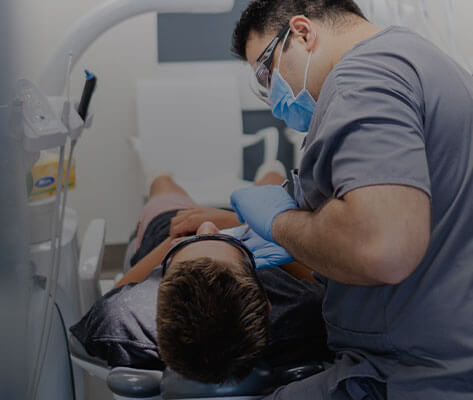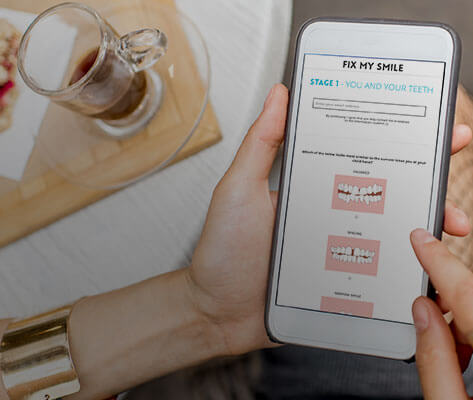frequently asked questions
braces faqs
When braces are first fitted, it is important to eat only soft food for the first 24 hours. During treatment, there are certain foods that can damage your braces which should be avoided. These include chewy foods (like muesli bars and licorice), crunchy foods (like popcorn, corn chips, and ice blocks), sticky foods (like caramels, lollies, and chewing gum), hard foods (like nuts and hard lollies), and foods that require biting into (like corn on the cob, apples, carrots), although these can be cut into bite-size pieces and eaten.
When you first get your braces, your teeth and mouth might feel a little tender. To relieve the discomfort, you can use pain killers (Nurofen) 30mins prior to eating. Some patients have found comfort by chewing on sugarless chewing gum. Your lips, cheek and tongue may become irritated during the first two weeks as they toughen up and become used to the braces. We will provide you with orthodontic wax which helps to create a barrier between the wire or bracket and your cheek.
If your teeth feel a little loose, don’t worry; this is normal! Your braces must first loosen your teeth in order to move them into the right position. Once your teeth have been repositioned, they will no longer feel loose.
The wires, bands and brackets may, on rare occasions, become loose. (This is mainly due to improper dietary habits.) If this happens, please contact us so we can assess the situation and, if necessary, schedule an appointment to repair it. It is very important that you inform us of any damage to your braces because damaged appliances can increase the length of your treatment. In some cases, the repair can wait until your next appointment.
You can temporarily fix the loose wire by using tweezers or the rubber on the end of a pencil to carefully and gently push the wire back into place. If the loose wire or bracket is causing irritation to your cheek or lips, put wax or a wet cotton ball over the wire or bracket to create a barrier between it and your cheek. Sugarless chewing gum can also help.
Yes. It is very important to brush and floss after every meal during treatment in order to keep your teeth and gums healthy. We will provide you with cleaning devices to help you keep your teeth and brackets clean. We will also provide a small travel kit that you can use when you’re away from home during meals.
No. However, we recommend that athletes protect their teeth by wearing a mouldable mouth guard while playing sport. Mouth guards are inexpensive and comfortable and will protect your teeth and braces. They can be purchased from a chemist or sports store. For musicians, there may be an initial period of adjustment after you get your braces on. There are also mouth guards specifically designed for musicians. We can recommend a company where you can purchase one of these.
In case of a sports emergency, be sure to immediately check your mouth and your appliance for any damage that may have occurred. If you notice any loose teeth or if your appliance has been damaged, please contact us. You can temporarily relieve the discomfort by using wax or by rinsing your mouth with warm salt water.
The twin block appliance is a device that is made up of two removable plates that clip onto the upper and lower (back) teeth. (The twin block appliance can also be fixed in place.) The appliance props your lower jaw forward so that its full growth potential can be reached in such a way that it creates a properly aligned bite. You will need to come into our practice every 6-8 weeks for adjustments of the appliance.
It is likely to be uncomfortable for the first 3-5 days. You can also expect some mild tenderness of your teeth and jaw muscles; this will disappear after a few days. Increased salivary flow and swallowing is also normal and will quickly pass. Your speech might be different but you can practice speaking aloud at home. The more you practice talking with the appliance, the easier it will get.
Remove the appliance three times a day to brush your teeth and rinse with a fluoride mouthwash. While the appliance is out of your mouth, clean it with a separate toothbrush and diluted mouthwash. Rinse thoroughly. Be very careful not to distort the wires.
Do not click the twin block appliance in and out with your tongue, as this will break the wires and increase treatment time. If a breakage does occur, please call us as soon as possible; do not wait for your next routine appointment.
Temporary Anchorage Devices are very small screws inserted into the jaw to act as immovable anchors to push against in order to move another tooth. The TAD does not move but allows a force to push or pull on other teeth. These are occasionally used when there is not a large tooth to push against. We use topical anaesthetic when placing TADs; these are removed when they are no longer needed.









